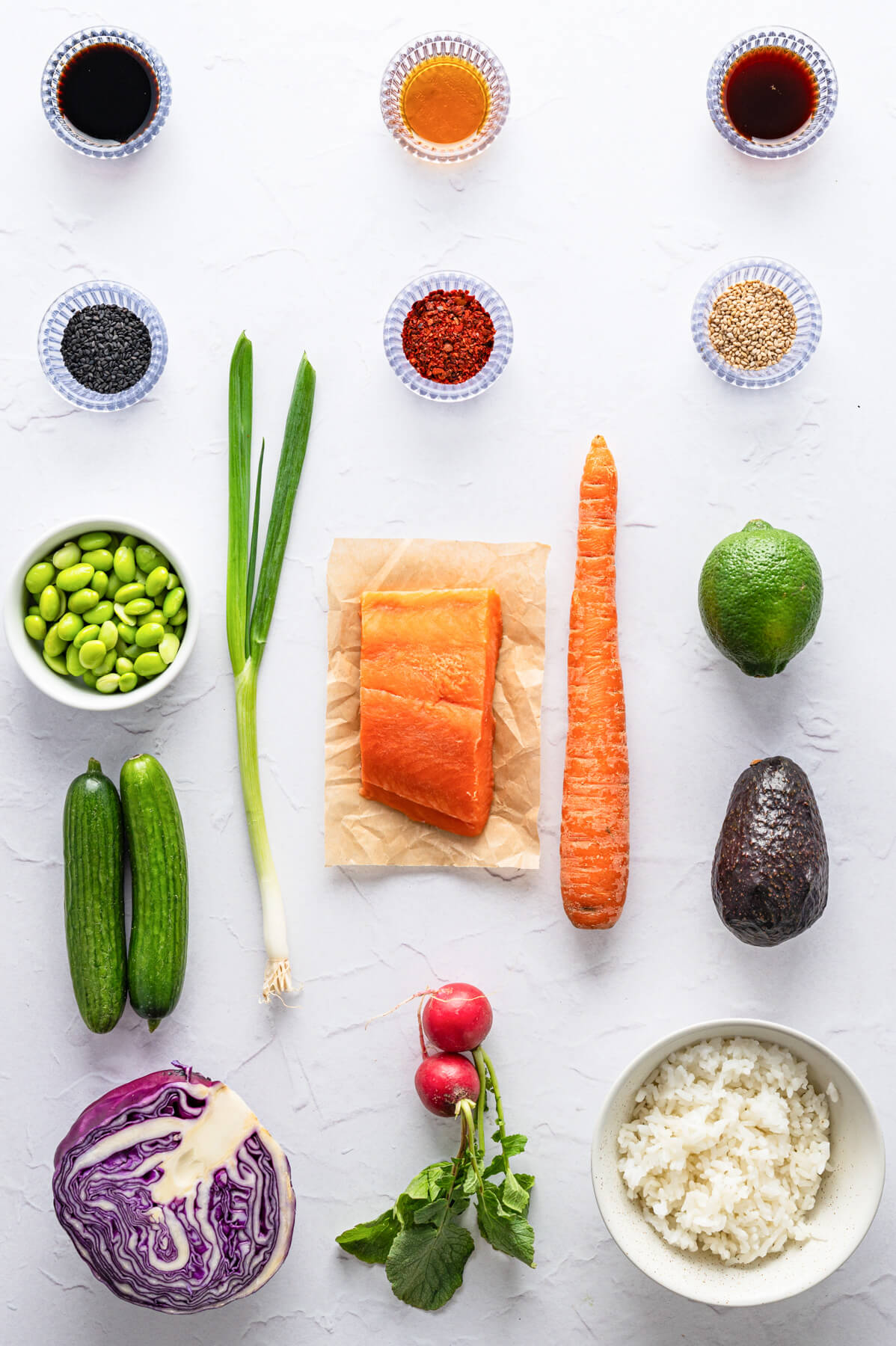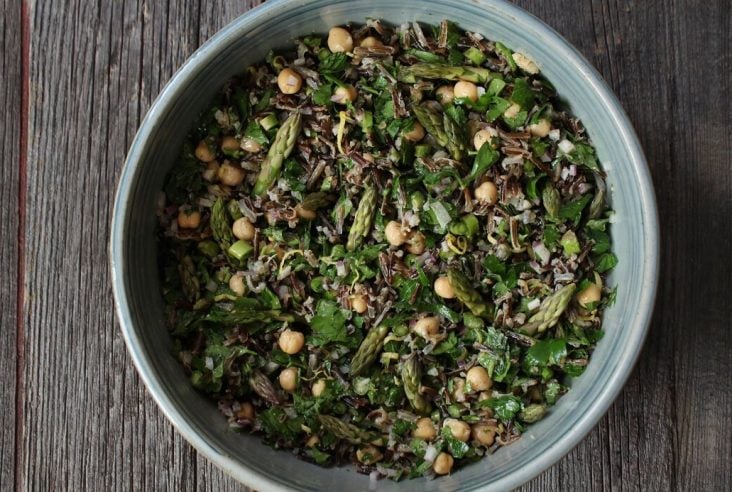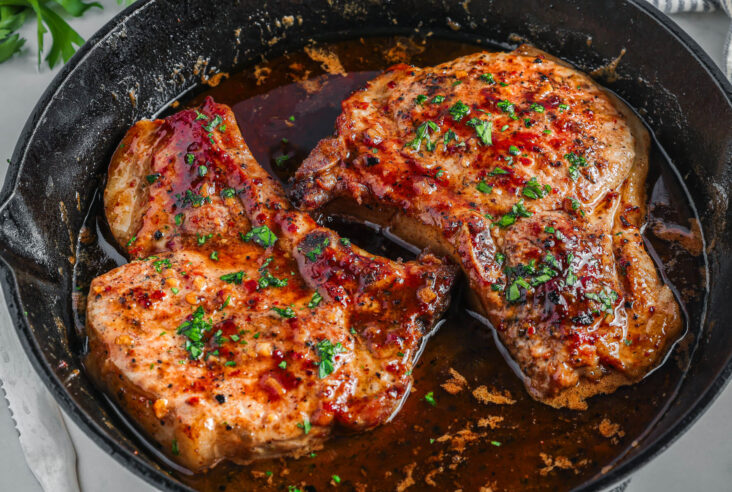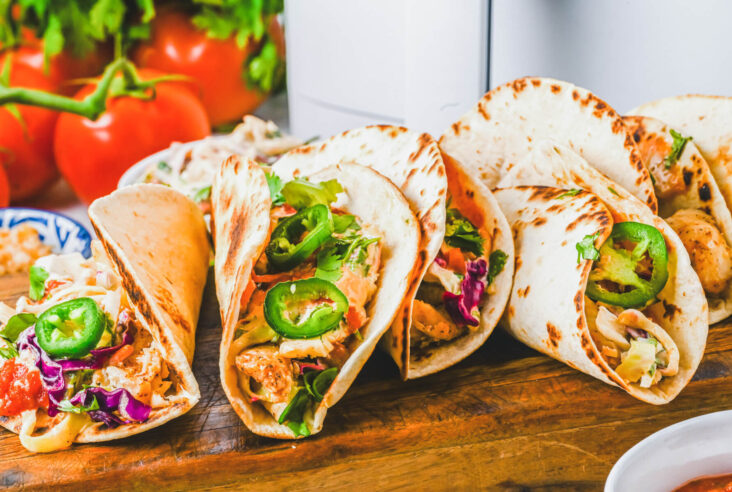Your family will love these fresh and tasty Salmon Poke Bowls featuring soy and sesame marinated salmon, seasoned sushi rice, and your favourite assorted vegetables. Make them for dinner tonight in under 30 minutes.
I don’t know about you, but I can always use more healthy weeknight dinner recipes. Enter protein rich fish and seafood. They’re both full of vitamins, minerals, and the important heart healthy fats you want in your life. However, the best part is, they cook incredibly quickly!
If you have an air fryer, you can have Teriyaki Salmon Bowls on the table in 20 minutes (it takes a bit longer in the oven!) or, if you have an Instant Pot, you can have a weeknight Shrimp Boil in less than 45 minutes.

Want to save this recipe?
Enter your email below and get this post sent straight to your inbox. Plus, I’ll send you my weekly newsletter featuring the newest and best Dish ‘n’ the Kitchen recipes every week!
Salmon Poke Bowls
There are so many quick and delicious ways to cook salmon. However sometimes, you don’t even have to cook at all! Enter these easy salmon poke (rhymes with okay) bowls. They’re everything you’re craving… perfectly seasoned sushi rice, crisp fresh vegetables, creamy avocado, and mouthwatering marinated bites of salmon.
Can we talk about the salmon? The fresh, sushi grade salmon is cut into large cubes before taking a brief bath in a umami rich marinade. The balance of flavours in the marinade elevates the salmon to a whole other level. I’m drooling on my keyboard as I write this!
For the poke bowls, I prefer to sushi rice and season it with a touch of seasoned rice wine vinegar and some salt. However, you can use your usual rice variety and/or leave out the seasoning, if you prefer.

Finally, feel free to use the suggested vegetable options, or add your own. You can serve this salmon poke recipe as bowls, or on its own as an appetizer. Furthermore, feel free to swap out the salmon for sushi grade ahi tuna and turn this salmon poke bowl recipe into tuna poke bowls.
What is Poke?
Not to be confused with Poke Cake, Poke is diced raw fish or seafood in a sauce. The word poke means ‘to slice’ in Hawaiian, and poke is one of the quintessential dishes of Hawaiian cuisine. However great food always travels and today you will find poke on menus around the world.
This popular dish had humble beginnings as a snack (often served with poi) made from fresh catch offcuts mixed with ground toasted candlenuts (Inamona), sea salt, and seaweed (limu).

Modern poke varieties are incredibly diverse in seasoning and additions. Poke counters serve all types of poke, from the classic soy sauce/sesame oil sauce combination to creamy Sriracha sauce laden mayonnaise poke and even cured ‘ceviche’ style poke. Other sauces include teriyaki oyster sauce, ponzu, and geung yung a Chinese ginger-scallion condiment usually served with chicken.
Popular additions include sweet Maui onions, scallions, red algae (ogo), crushed red pepper flakes, uni, salmon roe, tobiko (masago), kimchi, ginger, sesame seeds, cilantro, pineapple, along with diced jalapenos, avocados, and cucumbers.
The most common fishes originally prepared as poke are those found swimming in Hawaiian waters. These include Ahi (albacore tuna, big eye tuna, and yellowfin tuna), Aku (skipjack tuna), and A’u (blue marlin, striped marlin, shortbill spearfish, broadbill swordfish, and sailfish)

Additionally, any fresh shellfish that can be consumed raw or cured including octopus and limpets can be used in poke.
It’s interesting to note that salmon is not native to Hawaiian waters and only became introduced to the islands in the early 19th century. Hence, salmon poke and lomi salmon (a salt rubbed salmon dish with tomatoes and onions) only became a part of Hawaiian cuisine post European contact. Waves of immigration have also made their mark on this popular Hawaiian dish.
Ingredients in Salmon Poke Bowls
Simple fresh ingredients create the tastiest Salmon Poke Bowls. You can find most of these ingredients at any grocery store, though you may have to search for quality sushi grade salmon.

- sushi grade salmon
- ponzu
- soy sauce
- sesame oil
- Lime
- Black and White Sesame Seeds
- Pepper flakes
- Sushi Rice
- Sushi Vinegar
- Salt
- Purple Cabbage
- Cucumber
- Carrot
- Edamame
- Radishes
- Avocado
- Green Onions
Veggies: You can put pretty much any veggie you enjoy eating raw into the bowls! The sky is the limit!
Tamari or coconut aminos: For gluten free poke bowls, tamari or coconut aminos are good alternative to soy sauce. Ponzu is a citrus-based Japanese sauce with a tart-tangy flavour. Be sure to taste the marinade before adding the fresh lime juice to make sure it isn’t too sour.

Cilantro: Replace the scallions or add fresh cilantro to your toppings if you like!
English or Japanese cucumbers: Any other cucumber with a thin edible skin work great as an alternative to the Persian cucumbers.
Gochugaru or red chile flakes: If you like spice but have a hard time finding Aleppo pepper, the Korean chile flakes (Gochugaru) or regular red chile flakes are great replacements.
Use sushi grade salmon for poke only. Sushi grade means it is freshly caught, quickly processed, and frozen to kill any parasites. Farmed salmon is preferable over wild caught salmon. Raw sushi-grade tuna is a great substitute for salmon.

How to Make Salmon Poke Bowls
This salmon poke bowl recipe is incredibly easy. All you’ll need is a sharp knife, a cutting board, and a few bowls. I prefer to cook the sushi rice with a little bit of salt in a rice cooker while I marinate the salmon and prep the vegetables. There is no need to rinse sushi rice as the starch will help it stick together.
Once the rice is cooked, stir in 1 – 2 teaspoons of seasoned rice vinegar then close the lid and allow it to sit and steam further in the hot rice cooker. For the poke bowls, you can serve the rice warm or cold.

Marinate the Salmon
Use a sharp knife to dice the salmon into 1/2 inch cubes. In a large bowl, whisk together ponzu, soy sauce, roasted sesame oil, juice of a 1/2 lime, lime zest, green onion, black and white toasted sesame seeds, and Aleppo pepper if using.
Place diced salmon in the marinade bowl and turn to coat thoroughly with the marinade. Cover with plastic and place in the fridge while you prepare the other ingredients, 10 – 30 minutes.

Assemble the Poke Bowls
Pro tip: If you have a mandoline, it will make the process of slicing the vegetables a lot easier!
Divide the rice between 4 bowls. Arrange desired sushi bowl toppings (purple cabbage, edamame, julienned carrots, radishes, avocado, etc.) around the rice, leaving a space for the salmon. Add ¼ pound (4 ounces) of poke to each bowl. Garnish with sliced scallions and black and white sesame seeds.
Season with soy sauce, if desired. Enjoy!

Substitutions and Alterations
- Salad: If you prefer, you can make this into a salad instead of a rice bowl! Use your favourite hearty greens.
- Cold noodles: Cold soba, udon, or thin rice noodles are also great to use in place of rice.
- Citrus-based vinaigrette: If you feel that your bowl needs a dressing, opt for something with citrus as it pairs well with salmon.
Storage
Generally, salmon poke bowls are meant to be eaten right away. However, if you want to make them ahead of time or store ‘leftovers’, store the poke store separately from the toppings. It can last up to 3 days in the fridge in an airtight container.
I do not recommend freezing the poke as it will severely degrade the quality of the salmon especially with the acid from the lime soaked into the salmon.

Hi! I’m Bernice Hill and I am the sole recipe developer, photographer, and writer at Dish ‘n’ the Kitchen. It is my pleasure to share easy to follow recipes that are delicious, nutritious, and approachable for the whole family.
If you make this Salmon Poke Bowls recipe, I’d love to hear about it in the comments section or in a recipe rating. Be sure to follow me on Facebook and Pinterest for my latest recipes. Also, if you do make this recipe, please share your photos and tag me on Instagram. I hope you like this recipe!
Salmon Poke Bowl

Your family will love these fresh and tasty Salmon Poke Bowls featuring soy and sesame marinated salmon, seasoned sushi rice, and your favourite assorted vegetables. Make them for dinner tonight in under 30 minutes.
Ingredients
FOR THE MARINADE
- 1 pound (16 ounces) sushi grade Salmon; defrosted, skinless, ½ inch cubes
- 1 Green Onion; thinly sliced
- 2 Tablespoons Soy Sauce
- 1 Lime; zested and juiced
- 1 Tablespoon Roasted Sesame Seed Oil
- 2 Tablespoons Ponzu
- 1 Tablespoon Black Sesame Seeds
- 1 Tablespoon White Sesame Seeds
- 1 teaspoon Aleppo Pepper (OPTIONAL)
FOR THE BOWLS
- 1 1/2 cups Sushi Rice
- 1 - 2 teaspoons seasoned Sushi Vinegar
- 1 cup Purple Cabbage; shredded
- 2 Persian Cucumbers; thinly sliced
- 1 cup Edamame; shelled, cooked and cooled
- 1 medium Carrot; peeled and julienned, 2” long
- 4 Radishes; sliced thin
- 1 Avocado; sliced thin
- 2 Scallions; sliced thin
- Black and White Sesame Seeds
- Soy Sauce
Instructions
Cook sushi rice according to package directions. Season hot rice with 1 - 2 teaspoons seasoned sushi vinegar. Keep warm or chill if desired.
MARINADE THE SALMON
- Cut salmon filet into one inch pieces.
- In a large bowl, whisk together ponzu, soy sauce, roasted sesame seed oil, 1/2 lime juice (reserve other half for another use), lime zest, green onion, black and white sesame seeds, and Aleppo pepper if using.
- Place salmon in the bowl and coat thoroughly with the marinade. Wrap with plastic and place in the fridge while you prepare the other ingredients, at least 30 minutes.
ASSEMBLE THE BOWLS
- Divide the rice between 4 bowls.
- Arrange desired sushi bowl toppings around the rice, leaving a space for the salmon.
- Add ¼ pound (4 ounces) of poke to each bowl. Garnish with sliced scallions and black and white sesame seeds. Season with soy
sauce, if desired.
Nutrition Information:
Yield:
4Serving Size:
1Amount Per Serving: Calories: 489Total Fat: 27gSaturated Fat: 4gTrans Fat: 0gUnsaturated Fat: 21gCholesterol: 36mgSodium: 970mgCarbohydrates: 40gFiber: 9gSugar: 8gProtein: 25g
Nutritional calculation was provided by Nutritionix and is an estimation only. For special diets or medical issues please use your preferred calculator.





This is a fantastic way to eat salmon – flavours are bright, clean, and it’s crazy healthy and great protein. Add in some toasted panko, mango cubes, or even pineapple for variation. Highly recommended – would be great on a hot summer evening.
Thank you Jim! I’m so glad you love this recipe. Next time I’m going to add some mango!